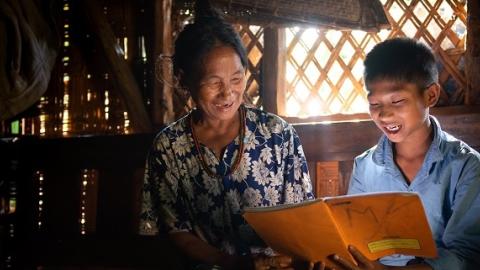
International Mother Language Day
This Thursday February 21, 2019 the world celebrates International Mother Language Day. This observance is focused on our collective commitment to the power of language to preserve, transmit, and shape our diverse cultural heritage.
Mother tongue education not only fosters respect for linguistic and cultural diversity, but also acts as a force for quality learning. Quite often, children from non-dominant language communities are required to begin their formal education in classrooms where the medium of instruction is a language they do not speak and barely understand.
Without early access to language, children fail to develop social and cognitive skills at the same rate as their peers, hindering their ability to learn to read and write and isolating them from society over the course of their lives.
Too often this results in a learning experience that is frustrating and unsuccessful. Students from language minorities who are unable to make use of the knowledge and experience they bring from their home community to learn new concepts in school fall behind early and, frequently, drop out altogether.
For children with a disability, the situation is often much worse. Of the estimated 32 million children around the world who are deaf, hard of hearing and deaf-blind (DHHDB), 80 per cent do not have access to education, and only two per cent receive instruction in sign language. World Vision is one of the founding partners of the All Children Reading Grand Challenge for Development.
Through this partnership we have supported the sourcing of technological solutions to improving the education opportunities for children with a disability, including software to make reading materials ‘born accessible’.
World Vision supports children to have the opportunity to learn first in their mother language as a means of promoting education that is more comprehensible, as well as more valued by students, parents and communities. We believe the use of mother tongue-based instruction leads to improved educational outcomes, makes a vital contribution to global citizenship by promoting intercultural connections, and supports the overall viability of the Sustainable Development Goals.
Why is mother language learning so important?
- Children’s first language is the optimal language for literacy and learning throughout primary school (UNESCO, 2008a), but many educational systems around the world teach children the national language or one not spoken at home.
- Children are more likely to enroll and succeed in school when they're instructed in their mother tongue (Kosonen, 2005).
- Parents are more likely to communicate with teachers and participate in their children’s learning (Benson, 2002)
Learn more about our work with communities around the world to encourage learning in mother languages:
- Visit the Creating Teaching and Learning Materials web page
- Ghana: Bringing mother language education home
- Guatemala: Supporting mother language learning and life skills
- Nepal: The alphabet song
References
Benson, C. (2002). Real and potential benefits of bilingual progammes in developing countries. International Journal of Bilingual Education and Bilingualism, 5 (6), 303-317.
UNESCO (2008a). Mother Tongue Matters: Local Language as a Key to Effective Learning. Paris: UNESCO.